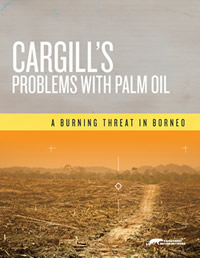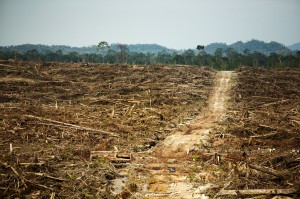
Since the release of our report on Cargill’s problems with palm oil in Borneo, Cargill has been scrambling to clean up their palm oil supply chain. Cargill has been engaging with customers including Kraft and General Mills; announced a supply chain audit in collaboration with WWF; and just last week announced that the assessment of their Harapan Sawit Lestari (HSL) plantation in West Kalimantan, Indonesia will begin in August. These are all great steps we’ve been recommending since 2007 to Cargill on how to clean up their palm oil supply chain, but they still have a long way to go to stop the destruction of Indonesia’s rainforests and peatlands.
On Friday I received a letter from Cargill inviting RAN to provide comments on our concerns regarding HSL plantation to BSI Group- a certification body that is auditing this plantation. This is one of the plantations, or group of plantations I should say, that was highlighted in our report on Cargill’s problems with palm oil that is operating in violation of the Roundtable on Sustainable Palm Oil (RSPO) Principles and Criteria, Indonesian law and Cargill’s own palm oil commitments.
Rainforest Action Network appreciates the invitation to share our ongoing concerns of violations of both the RSPO Principles and Criteria and Indonesian law. We will formerly submit our comments and concerns to BSI Group, while encouraging affected communities and NGO allies to do the same.

We remain concerned that Cargill continues to deny the findings in our report and say that our allegations are “unfounded.” RAN confidently stands by our findings. If all of our allegations are unfounded as Cargill says, I have a few burning questions. Why is HSL plantation and associated plantations missing permits required for operation under Indonesian law? Why didn’t Cargill publicly disclose that Indo Sawit Kekal (ISK), where clearing and burning of forests took place just this last year, as one of their plantations? I can go on and on.
We look forward to participating in this process and continuing to move Cargill towards a supply chain that is completely free of rainforest destruction.
In the meantime, Cargill still needs to hear your voices of encouragement and concern. Take action today to join the nearly 1,500 people who’ve recently sent letters to Cargill’s executives and board members, without which this invitation might not have occurred at all.
To all of you who’ve written Cargill already, great work!
Read our formal response to Cargill below.
July 28, 2010
Mark Murphy
Assistant Vice President, Cargill Corporate AffairsMark,
In response to your letter dated July 22, I am writing to ask for clarification of the process to involve stakeholders and the public in the pre-assessment and audit required for RSPO certification of Cargill’s HSL plantations.
While RAN appreciates the invitation to share our ongoing concerns of violations of RSPO principles and criteria and Indonesian law as outlined in our report with BSI, the certification body doing the audit, we are wondering if there is a formal process for stakeholder participation in this audit. Can you please clarify? We highly recommend that stakeholders from frontline communities and NGOs in Ketapang have the opportunity to be fully consulted in a fair and transparent way as part of the public assessment and final audit. It is our hope that exemplary stakeholder engagement and participation be a part of both the assessment/audit of Cargill’s HSL plantations, as well as the supply-chain audit being conducted in collaboration with WWF.
RAN looks forward to providing our input and concerns about Cargill’s problems with palm oil in these assessments/audits. As mentioned above, we will submit concerns about Cargill’s violations of RSPO P&C and Indonesian law and hope that our concerns are addressed and clarified with transparency and accountability.
While Cargill continues to deny the findings in our report and say that our allegations are unfounded, we stand by our findings. Clearing and burning has taken place in the last year at Cargill’s Indo Sawit Kekal (ISK) plantation, and the lack of proper permits to operate plantations West Kalimantan is rampant. We acknowledge that some of our findings may be based on outdated or lack of information from local government offices, and encourage Cargill to clarify this information to the public and your customers. It is our hope that this information will be clarified through the upcoming assessments/audits of Cargill’s HSL plantations and entire supply chain.
I look forward to your response.
Leila Salazar-Lopez
Agribusiness Campaign Director